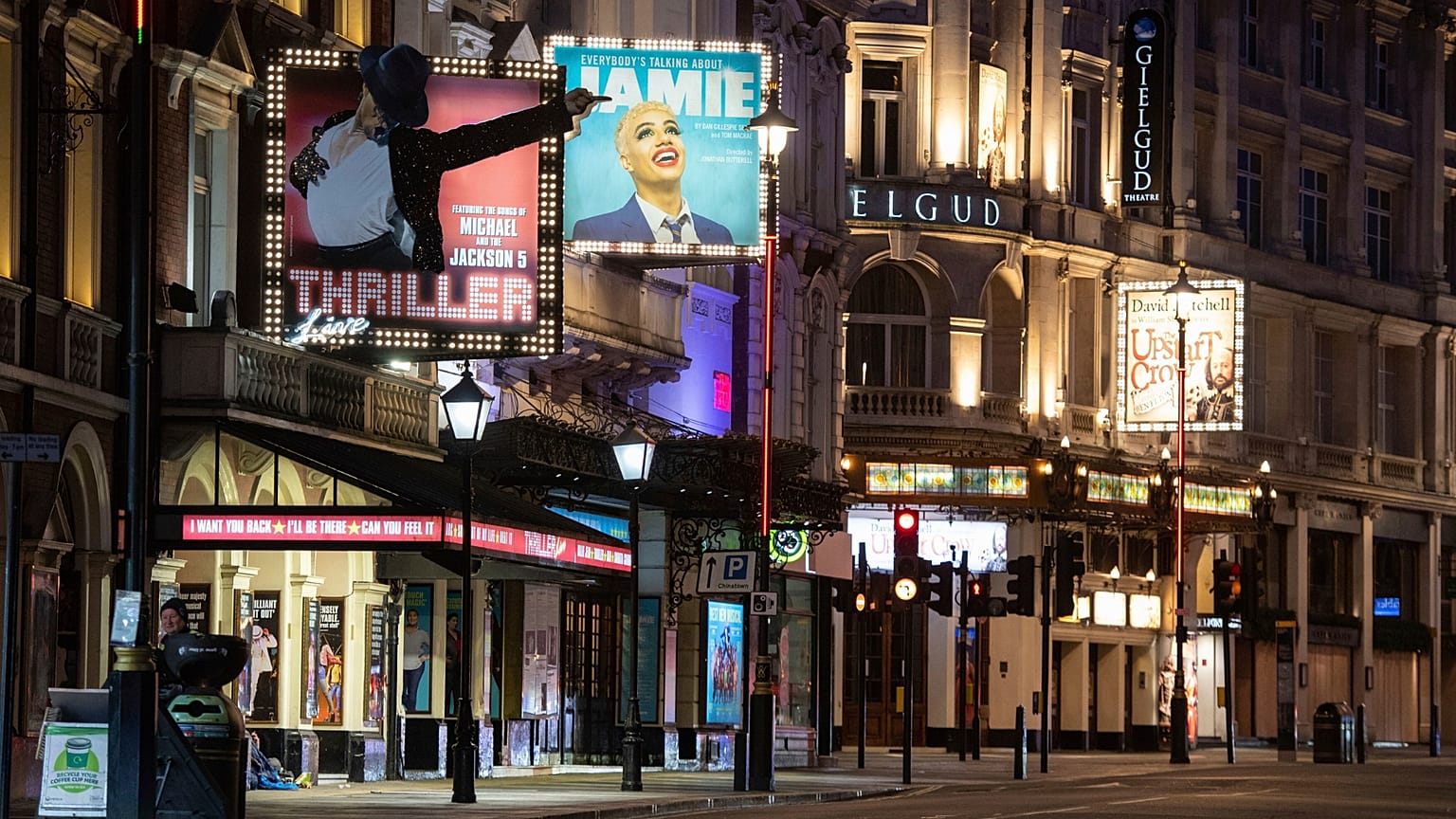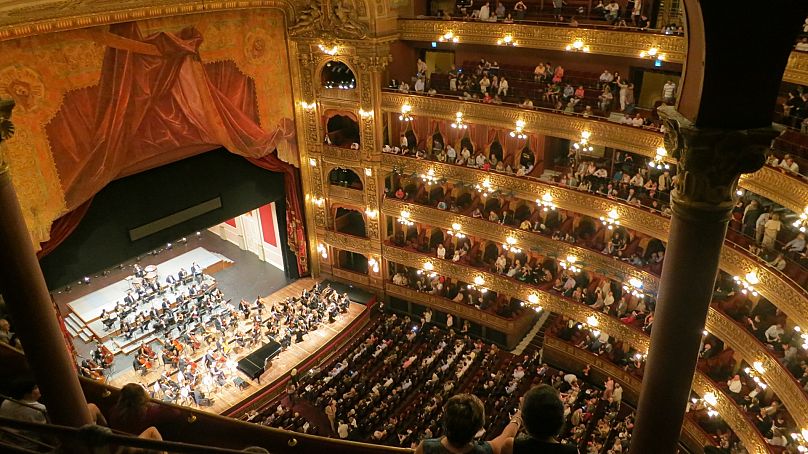Violence broke out at a British theatre after people started singing along to 'I Will Always Love You' at a performance of 'The Bodyguard'. Culture writer Jonny Walfisz weighs in on the issue of what theatre etiquette should be.
The ejection of audience members for unruly audience behaviour, singing along to ‘I Will Always Love You’ at a Manchester performance of The Bodyguard has put theatre etiquette into the spotlight again.
 ADVERTISEMENT
ADVERTISEMENT
 ADVERTISEMENT
ADVERTISEMENT
This Easter weekend, a performance of The Bodyguard at Manchester’s Palace Theatre came to an early finish as members of the audience started singing along to the show’s famous Whitney Houston number. Despite notices telling attendees to “refrain from singing”, multiple members of the audience started to sing, crowding out the vocals of lead actor and former Pussycat Doll Melody Thornton.
During the song, the stage lights went down, shouting was heard from the balcony, and when the house lights came up, theatre security were seen hauling the interruptive guests out. Despite that intervention, the show did not go on.
The police were then called by the theatre, not for the unwanted singers, but for the unprecedented levels of violence exhibited by other audience members demanding the singers stopped.
A spokesperson for the theatre said the show was cancelled because disruptive fans who refused to stay seated had spoiled the performance.
Are audiences getting worse?
While this incident has hit the headlines, it’s only the latest in a series of occurrences that has left the theatre industry in the UK scratching its head over what appropriate behaviour is and isn’t.
Multiple theatre’s artistic directors have come out in recent months with tales of worsening audience behaviour, particularly in the genre of jukebox musicals, where a show strings together a selection of popular hits.
Ambassador Theatre Group (ATG), the UK’s largest theatre organisation, has advised shows to change advertising campaigns to avoid phrases like “best party in town”, for fear it encourages bad behaviour.
From my own experience as a regular London theatregoer, in recent years I’ve noticed a definitive uptick in questionable behaviour. This is all anecdotal, yet more than ever am I noticing phone screens light up in the seats ahead and below me. The amount of indistinct chatter during performances has definitely risen too.
In one particularly egregious example, when attending a performance of Joseph and the Amazing Technicolour Dreamcoat, I sat next to a drunk couple who hollered their off-key renditions of every song in the first half. During the intermission, I asked if they’d sing a little quieter as I couldn’t hear the actors, only for them to redouble their efforts in the second half, purposely swaying and bashing into me throughout, while gleefully checking to see that it was annoying me. Had I been less timid, in retrospect, I would have rightly called an usher for their removal.
This was the exception though and the vast majority of times I’ve been to the theatre I’ve had pleasant experiences and enjoyed the show unobstructed. Still, it’s representative of the kind of disruption that is reportedly becoming increasingly common.
Discussing theatre etiquette is a complex topic. Today, theatre is seen as a bastion of cultural elitism, and, particularly in the UK, conversations about proper behaviour can end up accused of classism or snobbery.
In many European countries, the theatre is still treated with the hauteur that requires turning up dressed to the nines. The UK has largely lost that perception of theatre, and while many audience members may still be dressed in evening wear, jeans and t-shirts are no longer sniffed at.
The dos and don'ts of theatre etiquette
So, what are we actually talking about when we say “theatre etiquette”?
To my mind these are the basics. Using your phone while you’re in the auditorium is probably at the top of this list. The next most common no-no's are talking during the performance, eating or drinking loudly, and singing along with musical numbers.
Perhaps as a symptom of the pandemic, where we all retreated into solipsistic worlds of screens for months at a time, people are far less cognisant of the impact of their actions in crowded spaces. A phone screen, even on the dimmest possible setting, will always be distracting in a darkened theatre, and even if directed away, a source of light will be eminently visible. Anyone claiming otherwise is being disingenuous.
While there are some exceptions - diabetics who have to regularly check their blood-glucose levels, for example - using your phone during a performance shouldn’t be condoned, especially not to take photos of what’s happening on stage, as recently was the case where the Daily Mail shamefully shared nude photos of A Little Life ’s star James Norton, during a performance.
People love a selfie though. For the part of the population that doesn’t feel like they’ve truly attended something unless they’ve documented it on social media, hit-shows like the musical Six have encouraged relaxed final numbers, where audiences are allowed to stand-up, sing and take as many photos as they like.
Talking is the next etiquette no-no. This one’s a tad more complex. For the vast majority of audience members, talking should be absolutely discouraged, as it is distracting to others and off-putting to the actors (trust me, they can hear you). But it’s important to note that for some neurodivergent people, it’s much harder to go through a long performance staying absolutely quiet, or completely still.
There’s a good trend of introducing relaxed performances of shows, where audience members are encouraged to react more audibly if the usual asks of a theatre audience is too much. These are probably the best solution, although the ratio of relaxed performances to standard ones is still too low to be truly representative of the public.
When it comes to food and drink, the answer is ultimately down to the theatres themselves. Like in a cinema, no one particularly minds you eating quiet foods like popcorn, but if you’re going to make a scene with a full-roast dinner, maybe eat beforehand. Similarly, if guests are getting drunk and disorderly due to the theatre serving them alcohol, that’s a policy problem within the establishment itself.
Finally, singing along has seemingly become the main scourge of theatres across the land.
Yes, the songs in many musicals are classics that you love to sing along to. But equally many people have bought tickets because instead of singing along with friends, they want to hear a professional perform the songs live. That’s the point of a live show, and unlike a concert, the speakers in theatres often can’t drown out chatter. The simple solution is the one employed by Six and jukebox musicals like Mamma Mia!, where a finale medley of the show’s tunes play out and audiences are encouraged to sing and dance along.
A divided theatre community
Having dealt with the minutiae of what I deem acceptable levels of theatre etiquette, it’s worth mentioning how this discussion has split the theatre community.
When discussed on ITV’s ‘This Morning’ show, host Alison Hammond said she’d be “devastated” if she couldn’t sing along. Her co-hosts agreed at the time, but they’ve all since posted social media apologies taking back their remarks.
In the Guardian, theatre critic Arifa Akbar wrote an interesting opinion piece about how theatre’s used to be far more open to collective experiences. She makes multiple salient points about how theatre audiences in the past weren’t as uptight, with apples thrown on stage in 18th century theatres.
However, I can’t help but find her wider point that complaints about audience behaviour are designed by a certain sect of hoi polloi who’ve learned “the right protocols, presumably learned at finishing school” to be patronising. The idea that being considerate of actors on stage and other audience members is the reserve of the upper classes is condescending and classist itself.
Instead, I agree with Times theatre critic Clive Davis’ response, that inconsiderate behaviour of this kind may be pandemic-related. “You see the same weird disregard of other people in the way passengers on trains and buses routinely play videos on their phones with the volume turned up,” he writes.
Also worth mentioning, discussion of theatre in the UK lately has often focused on how exorbitantly expensive it has become, pushing out general audiences, while theatre makers barely earn enough money to make ends meet. On the other hand, these conversations regularly forget that there is always a selection of affordable seating that’s usually snapped up quickly, and how else do they expect theatre staff to get paid well in the future. Furthermore, if people are spending a lot, shouldn’t there be an expectation of considerate behaviour to others in the auditorium for whom this may be an extra special occasion.
Final word
Ultimately, I believe it comes down to a matter of respect and context.
Different art pieces ask different things of their audiences, and often they make it perfectly clear how audiences in general will want to react. Jukebox musicals, with their famous tunes, recognise there’s an instinct to sing along, hence the often-added medley finale. At a recent production of Zadie Smith’s north-west London immigrant-community spanning play The Wife of Willesden, a diverse audience engaged loudly, but it was clearly part of the social contract with the actors and the play’s setting, a raucous open pub. The same wouldn’t be expected at the four-hour adaptation of the queer trauma novel A Little Life, showing in a different theatre the same night.
Is it so hard to recognise that the problem isn’t much more complex than basic respect? London’s theatre industry is made up of phenomenal talent, putting their all on to bring the shows to light. That these performers stand there every night and bare their hearts and souls on stage doesn’t inspire at least a glimmer of quiet appreciation is a worrying trend. Unlike screens, there’s a real human being on stage in front of you, and they’re trying to do something you’ve paid to see them do, alongside hundreds of others.
Why is that so hard to appreciate?



















